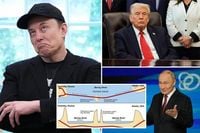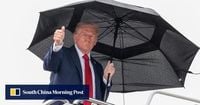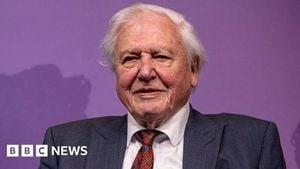It’s a proposal that sounds like something out of a science fiction comic strip: a massive undersea tunnel stretching across the Bering Strait, connecting Russia’s remote Far East with the U.S. state of Alaska. Yet, this decades-old notion has resurfaced with surprising vigor, propelled by a high-profile pitch from the Kremlin and a dash of billionaire bravado.
On October 16, 2025, Kirill Dmitriev, the chief executive officer of Russia’s sovereign wealth fund and a special envoy to President Vladimir Putin, took to social media with an audacious idea. In a series of posts, Dmitriev called on tech mogul Elon Musk and his tunneling venture, The Boring Company, to build what he dubbed the “Putin-Trump Tunnel.” The proposed link, stretching some 70 miles (or about 112 kilometers) under the icy waters between Alaska and Russia, would, in Dmitriev’s words, “symbolize unity” between the Americas and Afro-Eurasia. He even suggested that with Musk’s technology, the tunnel could be built for less than $8 billion—a fraction of the traditional $65 billion price tag usually attached to such mega-projects—and completed in under eight years, according to Bloomberg and TipRanks.
The idea of bridging the Bering Strait is hardly new. As CNBC and historical records point out, it dates back at least to the 1950s, when U.S. Senator Warren Magnuson of Washington envisioned a bridge or tunnel linking Alaska with Siberia. The concept reemerged in the early 1960s as the "Kennedy-Khrushchev World Peace Bridge," a utopian vision of rail and highway routes connecting New York to Paris. Dmitriev, referencing both history and modern technology, tweeted, "@elonmusk, imagine connecting the US and Russia, the Americas and the Afro-Eurasia with the Putin-Trump Tunnel – a 70-mile link symbolizing unity. Traditional costs are $65B+, but @boringcompany’s tech could reduce it to <$8B. Let’s build a future together!"</p>
But how feasible is such a project? The Bering Strait is a formidable stretch of water, largely frozen for much of the year, battered by frequent earthquakes, and surrounded by some of the harshest Arctic conditions on the planet. As TipRanks and ProPublica have noted, The Boring Company has mostly worked in hot, dry climates—like its tunnel beneath Las Vegas—raising questions about whether Musk’s technology could truly conquer the region’s permafrost, heavy sea ice, and seismic instability. In fact, environmental regulators recently fined The Boring Company in Nevada for what ProPublica described as an “extraordinary number of violations.”
Still, the proposal has captured imaginations on both sides of the Pacific, even if it’s also raised eyebrows. On October 17, 2025, President Donald Trump was asked about the tunnel during a White House press event with Ukrainian President Volodymyr Zelenskyy. According to Reuters and the South China Morning Post, Trump responded, “I just heard about it — a tunnel from Russia to Alaska. I just heard about that one. That’s an interesting one. We’ll have to think about that.”
Trump even turned to Zelenskyy during the meeting and asked, “What do you think of that, Mr. President? ... How do you like that idea?” Zelenskyy, whose country has been fighting a full-scale Russian invasion for over three years, replied bluntly, “I’m not happy with this.” Trump laughed and acknowledged, “I don’t think you’re going to like it! I don’t think he likes it!” as reported by the South China Morning Post and The New York Post.
The timing of Dmitriev’s pitch is far from coincidental. The tunnel proposal came just after a telephone call between Putin and Trump and ahead of an in-person meeting between the two leaders to discuss the ongoing war in Ukraine, according to TipRanks. Trump, for his part, has expressed a desire for the conflict to end, posting on Truth Social, "Enough blood has been shed, with property lines being defined by War and Guts. They should stop where they are. Let both claim Victory, let History decide! No more shooting, no more Death, no more vast and unsustainable sums of money spent. This is a War that would have never started if I were President. Thousands of people being slaughtered each and every week — NO MORE, GO HOME TO YOUR FAMILIES IN PEACE!"
While the tunnel would be a powerful symbol of unity, many analysts and observers see the proposal as a political maneuver—perhaps even a trolling gesture by the Kremlin, as Gizmodo speculates—at a moment when relations between the United States, Russia, and Ukraine remain deeply strained. The project has been described as “far-fetched” by The New York Post, and even Trump admitted he’d only just heard of it. Yet, the fact that the idea is being floated at the highest levels of government, and with a nod to Musk’s headline-grabbing innovations, speaks to the enduring allure of grand infrastructure dreams—even in the face of daunting practicalities.
For Musk, the proposition is both a compliment and a challenge. The Boring Company, while ambitious, has often over-promised and under-delivered, with projects that rarely match their initial hype. The company is currently working on a 10-mile high-speed transit system in Nashville, Tennessee, known as the Music City Loop, but that project has faced local protests and questions about transparency and public benefit, according to ProPublica. Musk himself has not publicly commented on the Bering Strait tunnel idea, and his lawyer and company representatives have not responded to media inquiries, as reported by The New York Post.
It’s worth noting that Musk’s business ties to Russia are not insignificant. Tesla’s supply chain has links to Russia, and SpaceX has launched Russian cosmonauts to the International Space Station alongside NASA astronauts. The Wall Street Journal has reported that Musk has spoken with Putin several times in the past, including secret talks in 2022. There are even claims that Putin pressured Musk to withhold Starlink, his satellite internet service, from Taiwan as a favor to Chinese President Xi Jinping.
As for the tunnel itself, the technical, environmental, and geopolitical challenges are immense. The Bering Strait’s waters are treacherous, and the region lacks the infrastructure necessary to support such a colossal undertaking. The cost estimates—ranging from Dmitriev’s optimistic $8 billion to the more traditional $65 billion—underscore just how speculative the project remains. And, as critics are quick to point out, the symbolic unity the tunnel would represent stands in stark contrast to the current reality of international relations, especially with the war in Ukraine showing no signs of abating.
Yet, the very fact that the idea is being seriously discussed, and that it involves some of the world’s most powerful leaders and wealthiest entrepreneurs, suggests that even the wildest infrastructure dreams can capture the global imagination. Whether the "Putin-Trump Tunnel" ever moves beyond the drawing board is anyone’s guess, but for now, it serves as a reminder of both the possibilities and the limits of visionary thinking in a divided world.
As the world watches for any sign of progress—on peace, on unity, or on the next big engineering feat—one thing is certain: the idea of linking Russia and Alaska by tunnel may be as old as the Cold War, but it’s far from dead. And in the unpredictable theater of global politics, even the most outlandish schemes can sometimes find new life.





